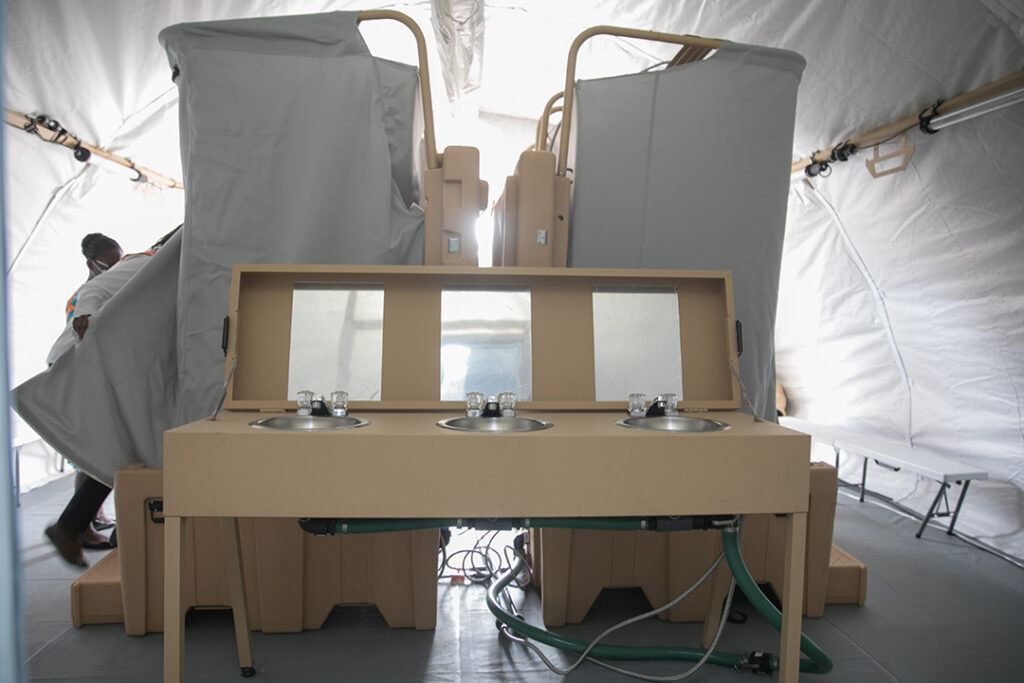ADF STAFF
The U.S. government announced in early September that it will donate oxygen generation equipment and a negative pressure isolation system to help Ghanaian health care workers treat critically ill COVID-19 patients.
Negative pressure isolation systems ensure that patients in any condition can receive medical care, including surgeries, without contaminated air flowing in or out of a patient’s room.
The U.S. also is donating four oxygen plants to Ghana, each with the capacity to produce 250 liters of oxygen per minute, which is enough to treat about 25 seriously ill patients a day.
The plants will be established at the Ghana Infectious Disease Center (GIDC), Kumasi South Hospital and Tamale West Hospital. Another already has been delivered to Cape Coast Municipal Hospital.
“This oxygen support is critical in the short term to help address Ghana’s COVID-19 critical care needs, and in the long term, strengthen Ghana’s provision of oxygen, intensive care, maternal and newborn care,” U.S. Ambassador to Ghana Stephanie Sullivan said in a report by Ghanaian newspaper The Daily Graphic.
Ghanaian Health Minister Kwaku Agyeman Manu said the U.S. donation was timely and essential due to oxygen shortages in the country. After an early August spike, infection rates in Ghana gradually declined in September.
“We were doing well until the new delta variant, which spreads faster, set in because our adherence to the protocols dropped to about 5%,” Manu told The Daily Graphic in a public appeal for people to adhere to basic prevention measures. “The government is looking forward to zero new infections on a daily basis for about six months. That is when those of us at the forefront will heave sighs of relief.”
Dr. Joseph Adjetey Oliver-Commey, acting director of the GIDC, also expressed gratitude for the donations. The 100-bed center only had 30 functional beds due mostly to lack of oxygen generation capabilities. More than 80% of the center’s patients had severe to critical COVID-19 cases as of September 10, Oliver-Commey told The Daily Graphic.
“This is the population for which the provision of oxygen is critical to their survival,” Oliver-Commey told the newspaper. “Sadly, we have lost 39 cases (15.2 per cent) of our clients.”
The U.S. has provided more than $30 million in support to Ghana since the pandemic began.
In May, Ghana finished the first phase of a U.S.-led COVID-19 critical case management training program at the GIDC. The program, which trained 86 Ghanaian clinicians, focused on oxygen therapy, mechanical ventilation, airway management, pulse oximetry, blood pressure monitoring and chest tube insertion.
The program also established critical care hubs in all of Ghana’s regional hospitals to ease the stress on facilities.
Other U.S. donations have included two state-of-the-art level 2 field hospitals to a treatment facility run by Ghana Armed Forces in Accra and a cache of medical supplies when COVID-19 cases surged last year.
U.S. Africa Command also has conducted tactical combat casualty care training, medical readiness exercises and pandemic response conferences.
Ghana was singled out among African nations for demonstrating empathy and clarity in communications during a health emergency in a book titled “
Political Communication and COVID-19: Governance and Rhetoric in Times of Crisis,” published in March.
Ghanaian President Nana Akufo-Addo also won praise for a comprehensive list of proactive measures taken just as the deadly virus established a foothold on the continent.

